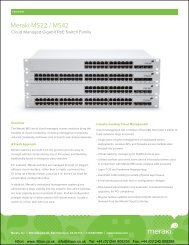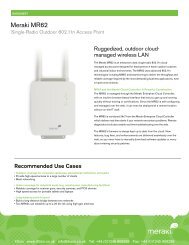Geneko GWR Cellular Gateway Series User Manual (PDF) - 4Gon
Geneko GWR Cellular Gateway Series User Manual (PDF) - 4Gon
Geneko GWR Cellular Gateway Series User Manual (PDF) - 4Gon
Create successful ePaper yourself
Turn your PDF publications into a flip-book with our unique Google optimized e-Paper software.
USER MANUAL<br />
<strong>GWR</strong> <strong>Series</strong> Router<br />
Settings - VPN Settings<br />
Virtual private network (VPN) is a communications network tunneled through another network,<br />
and dedicated for a specific network. One common application is secure communications through the<br />
public Internet, but a VPN need not have explicit security features, such as authentication or content<br />
encryption. VPNs, for example, can be used to separate the traffic of different user communities over an<br />
underlying network with strong security features.<br />
A VPN may have best-effort performance, or may have a defined Service Level Agreement (SLA)<br />
between the VPN customer and the VPN service provider. Generally, a VPN has a topology more<br />
complex than point-to-point. The distinguishing characteristics of VPNs are not security or performance,<br />
but that they overlay other network(s) to provide a certain functionality that is meaningful to a user<br />
community.<br />
Generic Routing Encapsulation (GRE)<br />
Originally developed by Cisco, generic routing encapsulation (GRE) is now a standard, defined<br />
in RFC 1701, RFC 1702, and RFC 2784. GRE is a tunneling protocol used to transport packets from one<br />
network through another network.<br />
If this sounds like a virtual private network (VPN) to you, that's because it theoretically is:<br />
Technically, a GRE tunnel is a type of a VPN — but it isn't a secure tunneling method. However, you can<br />
encrypt GRE with an encryption protocol such as IPSec to form a secure VPN. In fact, the point-to-point<br />
tunneling protocol (PPTP) actually uses GRE to create VPN tunnels. For example, if you configure<br />
Microsoft VPN tunnels, by default, you use PPTP, which uses GRE.<br />
Solution where you can use GRE protocol:<br />
• You need to encrypt multicast traffic. GRE tunnels can carry multicast packets — just like real<br />
network interfaces — as opposed to using IPSec by itself, which can't encrypt multicast traffic.<br />
Some examples of multicast traffic are OSPF, EIGRP. Also, a number of video, VoIP, and<br />
streaming music applications use multicast.<br />
• You have a protocol that isn't routable, such as NetBIOS or non-IP traffic over an IP network. You<br />
could use GRE to tunnel IPX/AppleTalk through an IP network.<br />
• You need to connect two similar networks connected by a different network with different IP<br />
addressing.<br />
Click VPN Settings Tab, to open the VPN configuration screen. At the Figure 15 you can see<br />
screenshot of GRE Tab configuration menu.<br />
Label<br />
Enable<br />
Local Tunnel Address<br />
Local Tunnel Netmask<br />
Tunnel Source<br />
Tunnel Destination<br />
Interface<br />
KeepAlive Enable<br />
Period<br />
Retries<br />
Description<br />
VPN Settings / GRE Tunneling Parameters<br />
This check box allows you to activate/deactivate VPN/GRE traffic.<br />
This field specifies IP address of virtual tunnel interface.<br />
This field specifies the IP netmask address of virtual tunnel. This field is<br />
unchangeable, always 255.255.255.252<br />
This field specifies IP address of tunnel source.<br />
This field specifies IP address of tunnel destination.<br />
This field specifies GRE interface. This field gets from the <strong>GWR</strong> Router.<br />
Check for keepalive enable.<br />
Defines the time interval (in seconds) between transmitted keepalive packets.<br />
Enter a number from 3 to 60 seconds.<br />
Defines the number of times retry after failed keepalives before determining that<br />
the tunnel endpoint is down. Enter a number from 1 to 10 times.<br />
30<br />
<strong>4Gon</strong> www.<strong>4Gon</strong>.co.uk info@4gon.co.uk Tel: +44 (0)1245 808295 Fax: +44 (0)1245 808299

















